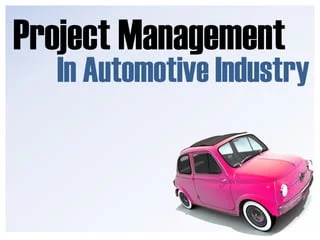About this training
Project Management in Manufacturing |TheSkope
About This Training
The Project Management in Manufacturing course is essential for managing and optimizing projects in the manufacturing sector. This program delves into project management principles, tools, and strategies tailored to the challenges of manufacturing environments. By mastering these techniques, you will improve your ability to lead projects effectively, enhance productivity, and ensure successful outcomes.
Why Choose Our Project Management in Manufacturing Course?
Our course provides a comprehensive understanding of project management tools and strategies specifically designed for manufacturing. You will learn practical approaches to planning, executing, monitoring, and closing manufacturing projects efficiently.
Once you complete this training, you'll be equipped with actionable skills to deliver value, meet deadlines, and optimize resources.
Course Highlights
Comprehensive Modules: Each module focuses on a critical aspect of project management with detailed explanations, case studies, and actionable steps.
Experienced Trainers: Learn from industry experts with a deep understanding of manufacturing project challenges and solutions.
Interactive Learning: Engage with quizzes, exercises, and simulations that mirror real-life manufacturing scenarios.
Flexibility: Access course materials anytime, ensuring you can learn at your own pace.
Comprehensive Modules: Each module focuses on a critical aspect of project management with detailed explanations, case studies, and actionable steps.
Experienced Trainers: Learn from industry experts with a deep understanding of manufacturing project challenges and solutions.
Interactive Learning: Engage with quizzes, exercises, and simulations that mirror real-life manufacturing scenarios.
Flexibility: Access course materials anytime, ensuring you can learn at your own pace.
Who Should Enroll?
Manufacturing Project Managers
Process Improvement Specialists
Production Supervisors and Team Leads
Operations Managers
Industrial Engineers
Entrepreneurs in Manufacturing
Professionals aspiring to specialize in project management
Manufacturing Project Managers
Process Improvement Specialists
Production Supervisors and Team Leads
Operations Managers
Industrial Engineers
Entrepreneurs in Manufacturing
Professionals aspiring to specialize in project management
Why You Should Learn Project Management for Manufacturing?
Enhanced Efficiency: Learn how to manage resources effectively, reducing waste and maximizing output.
Improved Decision-Making: Use data and analytical tools to make informed project decisions.
Risk Management: Identify, assess, and mitigate project risks to avoid delays and cost overruns.
Increased Stakeholder Satisfaction: Deliver projects on time and within scope to meet customer and organizational expectations.
Career Growth: Gain a competitive edge and unlock leadership opportunities in manufacturing.
Enhanced Efficiency: Learn how to manage resources effectively, reducing waste and maximizing output.
Improved Decision-Making: Use data and analytical tools to make informed project decisions.
Risk Management: Identify, assess, and mitigate project risks to avoid delays and cost overruns.
Increased Stakeholder Satisfaction: Deliver projects on time and within scope to meet customer and organizational expectations.
Career Growth: Gain a competitive edge and unlock leadership opportunities in manufacturing.
Course Structure
Introduction to Project Management in Manufacturing: Understand the role of project management and its impact on manufacturing success.
Planning and Resource Allocation: Learn to define project objectives, scope, and allocate resources effectively.
Time Management and Scheduling: Master tools like Gantt charts, Critical Path Method (CPM), and more to keep projects on track.
Quality Control in Projects: Incorporate quality assurance processes into project deliverables.
Risk and Change Management: Develop strategies to handle risks and adapt to project changes.
Leadership and Team Collaboration: Explore techniques to motivate teams and enhance collaboration.
Monitoring and Evaluation: Use Key Performance Indicators (KPIs) and Earned Value Management (EVM) for project tracking.
Project Closure and Continuous Improvement: Learn to evaluate project outcomes and implement lessons learned for future success.
Introduction to Project Management in Manufacturing: Understand the role of project management and its impact on manufacturing success.
Planning and Resource Allocation: Learn to define project objectives, scope, and allocate resources effectively.
Time Management and Scheduling: Master tools like Gantt charts, Critical Path Method (CPM), and more to keep projects on track.
Quality Control in Projects: Incorporate quality assurance processes into project deliverables.
Risk and Change Management: Develop strategies to handle risks and adapt to project changes.
Leadership and Team Collaboration: Explore techniques to motivate teams and enhance collaboration.
Monitoring and Evaluation: Use Key Performance Indicators (KPIs) and Earned Value Management (EVM) for project tracking.
Project Closure and Continuous Improvement: Learn to evaluate project outcomes and implement lessons learned for future success.
Real-World Applications
Case studies highlighting successful manufacturing projects and lessons learned.
Interactive assignments replicating manufacturing challenges, allowing participants to apply skills in practical scenarios.
Case studies highlighting successful manufacturing projects and lessons learned.
Interactive assignments replicating manufacturing challenges, allowing participants to apply skills in practical scenarios.
Certification Exam
Participants must complete an online assessment comprising multiple-choice questions. A passing score of 60% is required to earn certification.
Certificates are available in digital format, with an optional hard copy for Rs. 100.
Testimonials
“This course revolutionized the way I handle manufacturing projects. I can now plan better, execute efficiently, and achieve remarkable outcomes.”
— Ananya Sharma, Operations Manager ⭐⭐⭐⭐⭐
“The hands-on approach and industry-specific examples made this training incredibly practical and beneficial for my career.”
— Ravi Patel, Project Manager ⭐⭐⭐⭐⭐
Enroll Today
Join a community of professionals dedicated to excellence in manufacturing project management. Sign up now and start your journey toward project success!
Comments (0)
Quiz & Certificates









